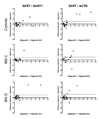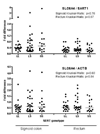Alterations in expression of p11 and SERT in mucosal biopsy specimens of patients with irritable bowel syndrome
- PMID: 17241856
- PMCID: PMC2474784
- DOI: 10.1053/j.gastro.2006.11.020
Alterations in expression of p11 and SERT in mucosal biopsy specimens of patients with irritable bowel syndrome
Abstract
Background & aims: The pathophysiology of irritable bowel syndrome (IBS) remains enigmatic; abnormalities in serotonin metabolism have been implicated. Two proteins that influence the function of serotonin and serotonergic receptors are serotonin transporter protein (SERT or soluble carrier protein, SLC6A4) and p11 (S-100A10, or calpactin I light chain). Both proteins are reported to be associated with depression-like states, a frequent comorbid condition in IBS. We explored the hypothesis that expression of these 2 proteins in colonic and rectal mucosa is abnormal in patients with IBS as compared with healthy controls.
Methods: Messenger RNA (mRNA) expression of SLC6A4 and p11 was measured in sigmoid and rectal mucosal biopsy specimens. Genotype of the promoter for SLC6A4 was also assessed in all participants. Validation studies explored reproducibility of 2 biopsy specimens taken from the same region and biopsy specimens taken an average of approximately 3 months apart.
Results: We found normal colonic mucosal expression of SLC6A4 in diarrhea (IBS-D)- or constipation-predominant IBS (IBS-C). On the other hand, p11 expression was increased in IBS. No significant effect on p11 mRNA expression in sigmoid colon or rectum was noted from antidepressant treatment in any of the analyzed subgroups.
Conclusions: Colonic mucosal expression of SLC6A4 in IBS is normal. Given that overexpression of p11 can increase serotonergic receptor functions (eg, 5-HT(1B) receptors), these data support the need for further study of the interaction between p11 expression in health and disease and its role in the therapeutic response to serotonergic agents, including antidepressants.
Figures





Comment in
-
Searching for the answer to irritable bowel syndrome in the colonic mucosa: SERTainty and unSERTainty.Gastroenterology. 2007 Jan;132(1):437-41. doi: 10.1053/j.gastro.2006.12.014. Gastroenterology. 2007. PMID: 17241891 No abstract available.
References
-
- Dunlop SP, Coleman NS, Blackshaw E, Perkins AC, Singh G, Marsden CA, Spiller RC. Abnormalities of 5-hydroxytryptamine metabolism in irritable bowel syndrome. Clin Gastroenterol Hepatol. 2005;3:349–357. - PubMed
-
- Atkinson W, Lockhart S, Whorwell PJ, Keevil B, Houghton LA. Altered 5-hydroxytryptamine signaling in patients with constipation- and diarrhea-predominant irritable bowel syndrome. Gastroenterology. 2006;130:34–43. - PubMed
-
- Lesch KP, Bengel D, Heils A, Sabol SZ, Greenberg BD, Petri S, Benjamin J, Muller CR, Hamer DH, Murphy DL. Association of anxiety-related traits with a polymorphism in the serotonin transporter gene regulatory region. Science. 1996;274:1527–1531. - PubMed
-
- Coates MD, Mahoney CR, Linden DR, Sampson JE, Chen J, Blaszyk H, Crowell MD, Sharkey KA, Gershon MD, Mawe GM, Moses PL. Molecular defects in mucosal serotonin content and decreased serotonin reuptake transporter in ulcerative colitis and irritable bowel syndrome. Gastroenterology. 2004;126:1657–1664. - PubMed
-
- Camilleri M, Atanasova E, Carlson PJ, Ahmad U, Kim HJ, Viramontes BE, McKinzie S, Urrutia R. Serotonin-transporter polymorphism pharmacogenetics in diarrhea-predominant irritable bowel syndrome. Gastroenterology. 2002;123:425–432. - PubMed
Publication types
MeSH terms
Substances
Grants and funding
LinkOut - more resources
Full Text Sources
Other Literature Sources
Medical

